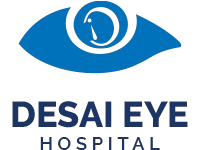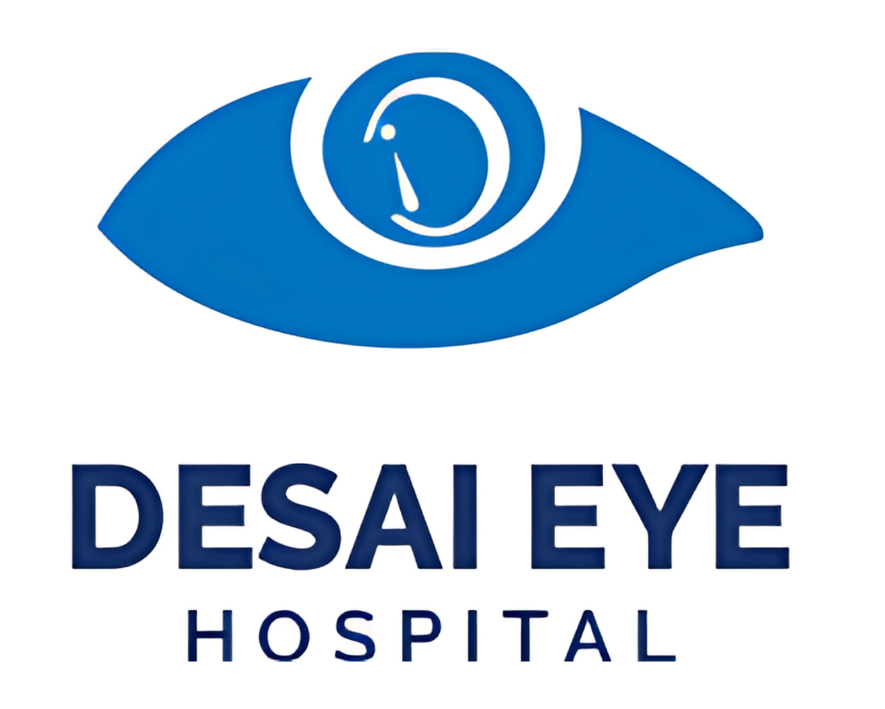Glaucoma is a group of eye conditions that damage the optic nerve, often associated with high eye pressure, and can lead to permanent vision loss if left untreated. It is one of the leading causes of blindness worldwide, making early detection and treatment crucial. At Desai Eye Hospital, Vadodara, we specialize in the diagnosis, management, and treatment of glaucoma to protect your vision and improve your quality of life.
What is Glaucoma?
Glaucoma is a progressive eye disease that causes damage to the optic nerve, which is responsible for transmitting visual information from the eye to the brain. The damage is often caused by increased intraocular pressure (IOP), but it can also occur even with normal eye pressure. If untreated, glaucoma can lead to irreversible vision loss.
There are two main types of glaucoma:
Symptoms of Glaucoma
In its early stages, glaucoma may not show noticeable symptoms. However, as the condition progresses, the following signs may appear:
- Gradual Loss of Peripheral Vision: In the early stages of open-angle glaucoma, peripheral vision may gradually diminish, often unnoticed by the patient.
- Tunnel Vision: As the disease advances, a person may experience tunnel vision, where they can only see what is directly in front of them.
- Blurred Vision: Some individuals with glaucoma may experience blurred vision or difficulty focusing.
- Severe Eye Pain and Redness: In the case of angle-closure glaucoma, sudden increases in eye pressure can cause severe eye pain, redness, and nausea.
- Headaches: Persistent or recurring headaches may be a sign of high eye pressure.
- Seeing Halos Around Lights: Glaucoma may cause the appearance of rainbow-colored halos around lights, especially in dim environments.
Because the disease often progresses without noticeable symptoms, regular eye exams are crucial for early detection.
Causes of Glaucoma
The exact cause of glaucoma remains unclear, but several factors can increase the risk of developing the condition:
High Eye Pressure: Increased pressure inside the eye, known as intraocular pressure (IOP), is the most common risk factor. However, some people with normal IOP can still develop glaucoma.
Age: Individuals over the age of 60 are at greater risk of developing glaucoma, especially those with a family history of the disease.
Family History: A family history of glaucoma increases the likelihood of developing the condition, particularly open-angle glaucoma.
Ethnicity: People of African, Hispanic, and Asian descent are at higher risk for certain types of glaucoma. For instance, African Americans are more likely to develop open-angle glaucoma at an earlier age.
Eye Injuries: Trauma to the eye can increase the risk of developing glaucoma.
Medical Conditions: Conditions such as diabetes, high blood pressure, and hypothyroidism can increase the risk of glaucoma.
Use of Steroids: Long-term use of corticosteroids can increase the risk of developing secondary glaucoma.
Diagnosis of Glaucoma
Early diagnosis is essential for preventing permanent vision loss. During an eye exam, your ophthalmologist will assess various factors to diagnose glaucoma:
Comprehensive Eye Exam: A thorough eye exam will include measuring intraocular pressure (IOP) using tonometry, examining the optic nerve for signs of damage, and testing peripheral vision.
Optic Nerve Evaluation: Using advanced imaging techniques, such as Optical Coherence Tomography (OCT) or a Fundus Camera, the ophthalmologist will assess the optic nerve head for any signs of damage caused by increased eye pressure.
Visual Field Test: This test checks for areas of vision loss in the peripheral field, which is commonly affected by glaucoma.
Pachymetry: A test that measures the thickness of the cornea. A thinner cornea can increase the risk of glaucoma.
Gonioscopy: This test helps the doctor examine the drainage angle of the eye, which can help diagnose angle-closure glaucoma.
Treatment of Glaucoma
Although there is no cure for glaucoma, treatment can help manage the condition, lower eye pressure, and prevent further damage to the optic nerve. The treatment approach depends on the type and severity of glaucoma:
Medications: The first line of treatment for glaucoma is usually eye drops that lower intraocular pressure (IOP). These drops can help either reduce the production of fluid in the eye or improve its drainage. Oral medications may also be prescribed in some cases.
Prostaglandin Analogues: These reduce IOP by increasing fluid outflow.
Beta-Blockers: These reduce fluid production in the eye.
Alpha Agonists: These both reduce fluid production and increase fluid drainage.
Carbonic Anhydrase Inhibitors: These lower IOP by reducing fluid production.
Laser Therapy: In some cases, laser treatment may be used to improve the drainage of fluid from the eye or to treat other complications:
Laser Trabeculoplasty: A laser is used to open up the drainage system of the eye, helping fluid drain more easily and lowering IOP.
Laser Iridotomy: This treatment is used in angle-closure glaucoma to create a small hole in the iris, allowing fluid to flow more freely.
Surgical Treatments: If medications and laser therapy do not adequately control eye pressure, surgery may be required. Surgical options include:
Trabeculectomy: A procedure to create a new drainage pathway for fluid in the eye.
Tube Shunt Surgery: A tube is implanted in the eye to help drain excess fluid.
Minimally Invasive Glaucoma Surgery (MIGS): Less invasive procedures that can help lower IOP with fewer risks and quicker recovery times.
Lifestyle Changes: Managing underlying conditions, such as diabetes and hypertension, can also help reduce the risk of glaucoma progression. Regular exercise, a healthy diet, and avoiding smoking are also beneficial for eye health.
Conclusion
Glaucoma is a serious eye condition that can lead to vision loss if not properly managed. Early detection through regular eye exams is key to preventing severe vision impairment. At Desai Eye Hospital, Vadodara, we offer advanced glaucoma treatments and a personalized approach to preserve your sight. If you are at risk of glaucoma or have been diagnosed, don’t wait—schedule an appointment with our expert ophthalmologists today.
Contact Information:
Desai Eye Hospital
2nd Floor, Sakar East Complex
Next to Shilp Residency, Opposite Bansal Mall
Tarsali, Vadodara, Gujarat 390004
Phone: 0265 298 0298
Working Hours:
Mon – Fri: 08:00 AM – 6:00 PM
Saturday: 09:30 AM – 05:00 PM
Sunday: 09:00 AM – 03:30 PM
We also offer cashless tie-ups with various insurance providers for your convenience. Ensure the health of your eyes and safeguard your vision—visit us at Desai Eye Hospital today!


